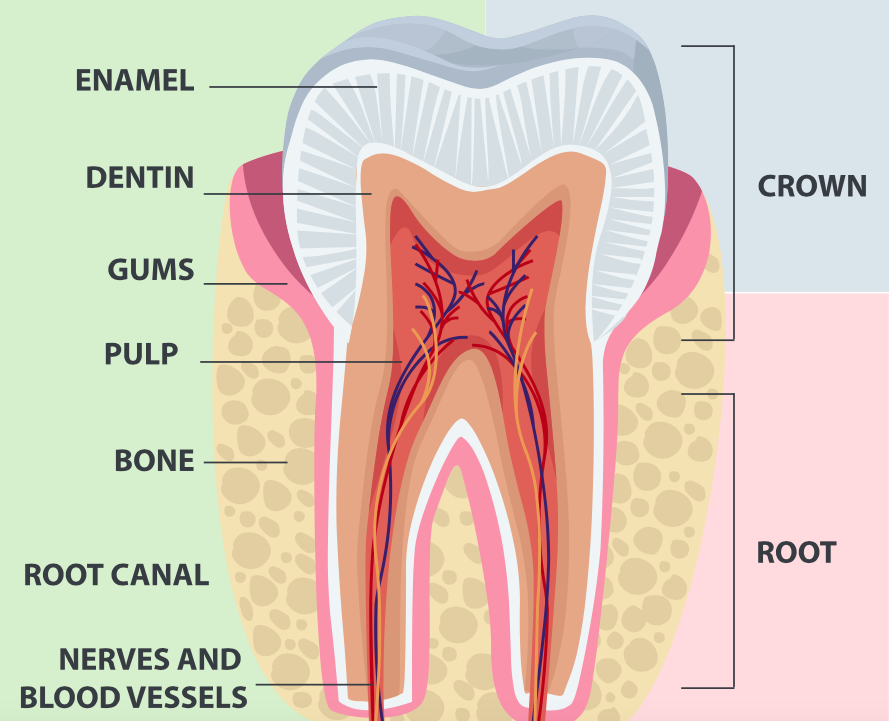How to Help A Child’s Toothache

While it may seem tempting to just wait and see if the pain disappears on its own or to try out home remedies for toothaches, we generally advise against both of these routes. Toothaches are typically a sign that your child is suffering from a dental injury or infection. Making an appointment with your child’s pediatric dentist right away can help ensure that your child receives the treatment and care he or she needs before the injury or infection worsens.
In this articles, we will discuss the following topics:
- What Causes Toothaches in Children?
- How to Tell If Your Toddler Has A Toothache
- How to Treat Toothaches in Children
What Causes Toothaches in Children?
Toothaches in children usually occur as a result of damaged or exposed “dentin” or “dental pulp.”
The crown of a child’s tooth (i.e., the visible part of the tooth above the gum line) consists of three layers. The hard, protective outer layer is called enamel. Below the enamel lies dentin, which is a hard but porous surface. Beneath the dentin lies soft tissue called dental pulp, which contains nerves, blood vessels and connective tissue.

Dentin contains tiny tubes that connect the enamel to the dental pulp. When a tooth loses enamel and the dentin becomes exposed, hot, cold, sugary and/or acidic foods can stimulate the nerves inside the dental pulp through these tiny tubes. This results in tooth pain or sensitivity.
If the nerve-filled dental pulp becomes damaged, it can lead to severe and persistent tooth pain.
Thus, different types of dental injuries and infections result in different types of tooth pain. Below we describe some of the most common types of tooth pain that we see at Hurst Pediatric Dentistry, as well as a few possible causes for each type of pain. Keep in mind that determining the true cause of a child’s toothache can be harder than it seems, and a trip to the dentist is typically necessary.
What Causes Persistent, Throbbing Tooth Pain without Any Identifiable Trigger?
When we see children with persistent, intense tooth pain – pain so bad that it prevents the child from sleeping properly at night – the cause is often either inflammation of the dental pulp or an abscess. (A tooth abscess is a build-up of pus in a tooth in response to a bacterial infection.)
Deep cavities, gum disease and dental trauma can all lead to inflamed dental pulp and/or dental abscesses in children. Treatment of the underlying condition is necessary to relieve resulting toothaches and to prevent infections from worsening and spreading.
What Causes A Constant, Dull Ache in A Child’s Teeth or Jaw?
The most common causes we see for this type of pain in children include infection of the dental pulp, gum disease and impacted wisdom teeth (i.e., wisdom teeth that do not have enough room to erupt or develop normally). Treatment of the underlying condition is necessary to relieve resulting toothaches and to prevent infections from worsening and spreading.
Why Does My Child Have Tooth Pain After Eating Hot, Cold, Sugary and/or Acidic Foods?
When children experience this type of tooth pain, it is often a result of either cavities or dental trauma. Both tooth decay and dental injuries can damage the enamel on your child’s teeth, leaving the dentin exposed. Toothaches caused by exposed dentin are often treatable with a simple filling or a dental crown.
What Causes A Sharp, Stabbing Pain When Chewing?
This type of pain is frequently the result of a cracked tooth. When a child’s tooth is cracked, the pressure of biting down can cause the crack to open. When the child releases the bite, he or she may feel a sharp pain as the crack quickly closes. Interestingly, pain from a cracked tooth can be inconsistent – a child might only feel pain when he or she chews in a very specific way – and sometimes it can be difficult for the child to even know which tooth is hurting.
Treatment for a child’s cracked tooth depends on the type, location and size of the crack and the extent of the damage the crack has caused to the dental pulp. In some cases, a simple dental filling may be sufficient. Other cases may require pediatric pulp therapy or even extraction of the cracked tooth.
How to Tell If Your Toddler Has a Toothache
What if your child cannot yet communicate pain to you verbally? Your baby or toddler might not be able to tell you which tooth hurts or what the pain feels like, but he or she can provide non-verbal clues that something is wrong. Common signs of a toothache in babies and toddlers include
- fussiness;
- constant rubbing of the teeth, gums and/or jaw;
- sudden changes in eating habits, including refusal to eat; and
- difficulty sleeping.
Many babies and toddlers experience these symptoms to some degree while teething. However, it’s a good idea to consult a pediatric dentist if your child appears to be experiencing persistent discomfort and none of the techniques we recommend for relieving teething pain seem to help.
If your baby or toddler has a fever of 100.4 degrees Fahrenheit or higher in addition to the above symptoms, you should consult with your child’s pediatrician to rule out potentially serious medical conditions.
How to Treat Toothaches in Children
Although it may be tempting to try at-home toothache remedies for kids, the best thing to do if your child is experiencing tooth pain is to make an appointment with a pediatric dentist right away. Most cases of tooth pain require professional treatment, and waiting too long to see your child’s dentist could lead to potentially serious complications.
The treatment your child’s dentist will perform depends on the cause of the toothache. For brief descriptions of the treatments pediatric dentists use to cure several common types of toothaches, see What Causes Toothaches in Children, above.
While you’re waiting for your child’s dental appointment, try to avoid any foods that trigger tooth pain in your child. If your child needs immediate pain relief for the toothache, you may want to try giving your child Tylenol or Ibuprofen. Make sure to follow the dosage instructions provided on the packaging.
Call Hurst Pediatric Dentistry to Schedule an Appointment
The best way to help a child’s toothache is to contact a pediatric dentist who can determine and treat the underlying cause. If your child has tooth pain, make an appointment at Hurst Pediatric Dentistry right away. You can call our office at (817) 510-6400 and we’ll be happy to get an appointment scheduled for you.
Hurst Pediatric Dentistry is located in Hurst, Texas. Our dentist, Dr. Lin, is a board-certified pediatric dentist who provides dental exams and restorative dental treatments for children in Hurst, Euless, Bedford, North Richland Hills, Keller, Colleyville, Southlake, Watauga, and the surrounding area.
This article is intended to provide general information about oral health topics. It should not be used to diagnose or treat any medical condition or as a substitute for the advice of a healthcare professional who is fully aware of and familiar with the specifics of your case. Always seek the advice of your dentist or other qualified healthcare provider with regard to any questions you may have relating to a medical condition or treatment.
MEDICALLY REVIEWED BY:
Dr. Jin Lin

Dr. Jin Lin is a board-certified pediatric dentist with a passion for helping children achieve healthier, more beautiful smiles. He earned his Bachelor of Science degree from Cornell University and his Doctor of Dental Medicine (D.M.D.) degree from the Harvard School of Dental Medicine. After graduating cum laude from dental school, he completed his post-doctoral pediatric dentistry training at Boston Children’s Hospital and the Harvard School of Dental Medicine, where he served as chief resident and worked with children with a wide variety of special medical and dental needs, including children with rare syndromes.

